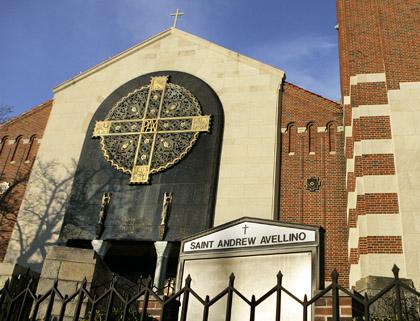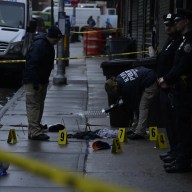By Anna Gustafson
In more than a dozen churches and synagogues throughout Queens, there is a conspicuous absence of 150 homeless men and women who once found shelter in the religious institutions during the cold winter months.
Adults hard on their luck — those who had lost a home because of foreclosure or could not pay their rent because their jobs had been cut — will no longer be able to find a place to sleep or a warm bite to eat at places like the St. Andrew Avellino parish in Flushing, Blessed Sacrament in Jackson Heights, St. Nicholas of Tolentine in Jamaica, Immaculate Conception in Astoria or Sacred Heart in East Glendale.
Increasingly difficult financial times have forced the city to shut 21 homeless shelters run primarily by volunteers as part of The Partnership for the Homeless’ emergency shelter network, the nonprofit group’s director said city officials told them in October. The city Department of Homeless Services contracted with the nonprofit to run the shelters.
State Assemblyman Rory Lancman (D−Fresh Meadows), hundreds of volunteers and nonprofit leaders said they were upset the city has cut 150 beds, especially at a time when the Coalition for the Homeless reported a record 1,464 newly homeless families entered the city’s shelter system in September.
Rising numbers of foreclosures and the job losses that have been sweeping the country are forcing many people onto the streets, said Zoilo Torres, director of The Partnership for the Homeless’ emergency shelter network, which still runs about 60 shelters throughout the city.
“We deal with a population that is suffering a period of homelessness because of a crisis in the family, they’ve lost their jobs or they can’t afford their rent,” Torres said. “The city is closing down a volunteer organization that saves the city money.”
Though Torres said city officials cited budget concerns when informing the group of the 150−bed loss, a Department of Homeless Services representative said the decision was made in order to run a more efficient shelter system.
According to the representative, the nonprofit group’s shelters often operated fewer than five nights a week and were only open two to three months a year.
“In actuality, the number of church beds, Safe Haven beds, and stabilization beds — all options for those New Yorkers most in need on the streets — will increase significantly next fiscal year,” Heather Janik, spokeswoman for the Department of Homeless Services, wrote in an e−mail.
“There will be over 1,000 beds available in total, which is a more than 50 percent increase from the previous fiscal year,” she said. “The 450 church beds will be streamlined to be more efficiently linked to drop−in centers in the immediate vicinity for client convenience. What is most important is that at the end of the night, individuals are coming off the street into a bed.”
Torres and Lancman said that while the city may believe it is more efficient to eliminate the 150 beds in the churches and synagogues, they said the program was run almost entirely by volunteers who found the program played an integral part in their lives.
“My concern is that the city is consolidating these homeless people, and they shouldn’t be consolidated,” Lancman said. “They’re going to be shipped off to a big city shelter and we’ve all heard the horror stories about city shelters. For the individual homeless person, it’s about being treated like a human being. Homelessness is not a crime. Maybe their home has been foreclosed or they have a mental illness, and they shouldn’t be treated like an anonymous number to be shuttled into some homeless warehouse.”
Because the shelters were run by volunteers, Torres said the program was able to save the city money.
For example, St. Andrew’s was able to provide 10 beds from November until around April for less than $10,000. According to the Independent Budget Office, the city spent nearly $32,000 per homeless adult last year.
Lancman has sent a letter to Mayor Michael Bloomberg urging him to provide funding for the 150 beds and close to 1,000 members of St. Andrew have signed a petition asking the mayor for the same thing.



























